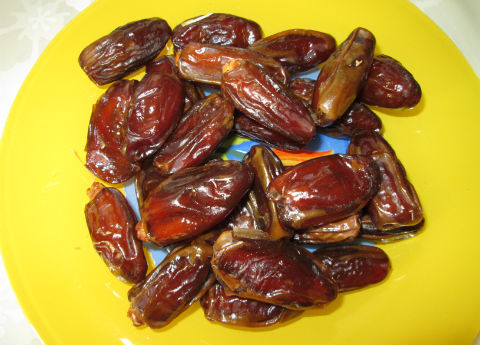Health Benefits of Dates

Article Contents:
Dates are the fruits of the date palm tree, a native tree in the Middle East and Northern Africa. However, this tree can be cultivated in many other places as well. Dates can be eaten fresh or dried, with the dried types being the more popular variant.
Interesting Facts about Dates
Date fruits are known in the world over. As a matter of fact, it is the oldest tree ever cultivated. These fruits have very high natural sugar content and tastes like honey. This fruit is very popular among the Muslim communities, especially during their fasting season. Muslims eat dates after fasting in order to prevent overeating. Dates are mostly taken as desserts. This wonder fruit proves to have tons of medicinal values and health benefits, which even doctors can attest to.
Dates Nutrition Facts
Dates are scientifically referred to as the Phoenix Dactylifera. Every 100g of this fruit can provide a long list of nutritional benefits. It contains vitamins, electrolytes, minerals, and phytonutrients. Dates can provide 14% of the required RDA of energy, which is equivalent to 277 Kcal. It contains 58% RDA or 74.97 grams of carbohydrates, 3% or 1.81 grams of protein, and 18% or 6.7 grams of dietary fiber. Dates has less than 1% total fats and have 0% cholesterol.
As for vitamins, dates contain sufficient amounts of the B Vitamins such as Folate, Niacin, Panthothenic acid, Pyridoxine, Riboflavin, and Thiamin. It also carries Vitamin A and K. Of all of these, Pyridoxine takes the highest concentration of nutrients at 19% RDA or 0.249 grams.
As for electrolytes, date fruits may contain sodium and potassium. The sodium content of this fruit however, is very quite low at 1 mg. Potassium, on the other hand, is fairly high at 16% RDA or 696 mg. When it comes to minerals, it contains calcium, copper, iron, magnesium, manganese, phosphorus, and zinc. Its copper content is high at 40% RDA or 0.362 mg. The phytonutrients that a date fruit contains are Beta Carotene, Crypto-xanthin, and Lutien.
Health Benefits of Dates
Dates boasts of an even longer list of health benefits for people who consume them every day. Below are just some of what you can enjoy by making this fruit a part of your daily diet.
1. Helps relieve constipation
Dates are regarded as a potent laxative. As such, they can relieve all causes of constipation because of their high levels of soluble fiber. To use it for such a purpose, simply soak the dates overnight and eat them in the morning. The effect is a more comfortable passage of digested food in the intestinal tract, and eventually, out of the body.
2. Boosts energy
It is easy to gain 300 Kcal of energy by consuming 100g of dates. Dates are great sources of natural sugars such as fructose, sucrose, and glucose. The liver can process these natural sugars fast and convert them into energy.
3. Improves the functions of the heart and blood.
Keep your heart healthy by eating dates on a regular basis. Because of the nutrients and the healthy fats that this fruit contains, the heart finds it easier to pump blood all over the body. And which state, the chances of developing or acquiring heart diseases become lower. Blood problems like anemia and high pressure are also prevented.

4. Has antioxidant properties
There are many antioxidants jam-packed in a date fruit and all of these can help keep the body strong and healthy. Dates have flavonoids, which in turn, possess anti-inflammatory, anti-hemorrhagic, and anti-infective properties. Its high Vitamin A content can prevent the oral cavity and lung cancer.
5. Protects the nervous system
The nervous system is where the central processes of the body take place. Dates can ensure one of a more responsive and a healthier nervous system, while speeding up the functions of the brain. Dates can keep a person alert. Those who want to keep their mind sharp should eat dates.
Side Effects of Dates
Although dates have got lots of health benefits, it may cause certain side effects as well, especially when taken in massive doses. The known side effects of dates are:
1. Tooth decay
Because of the high sugar content of dates, tooth decay is the most common complaint. To reduce the instances of this side effect, it is highly advised that one brush his teeth after eating them.
2. Bloating
When dates are consumed with a glass of water, bloating may occur. When eating dates, always keep in mind that you have to allow several minutes allowance before drinking water.
3. Allergies
Some people will experience allergic reactions when eating dates. If this occurs, consult with your doctor right away in order to prevent further complications.
How to Buy Dates, Storage, and Recommended Daily Consumption
Dates come in different varieties and picking the right one to enjoy its full nutritional value is necessary. The best types of dates are the ones called Black Sphinx. The most common type, on the other hand, is the Medjool dates. When buying these fruits, be sure that they are ideally preserved. Sugar crystals must not have formed on the skin of the dried fruit, or the flesh will taste dry and will have a leathery feel.
When preserved right, dates can be stored for a long period of time. Dried dates can last anywhere from 3 to 12 months when stored at a cool, dry place. It can go up to 2 years when refrigerated. Always check the dates on the packaging to prevent any storage problems. Fresh dates, of course, can only be stored for a maximum of one week in the freezer.
The recommended daily allowance of dates is 100g. Eat dates in the right quantities to assure yourself of maximum nutrition without experiencing any of the side effects.
"Test yourselves if you are in the faith; examine yourselves!" - Bibel, 2 Cor. 13:5
10 Questions to Examine and Test Your Faith in God
Test Yourself Now
